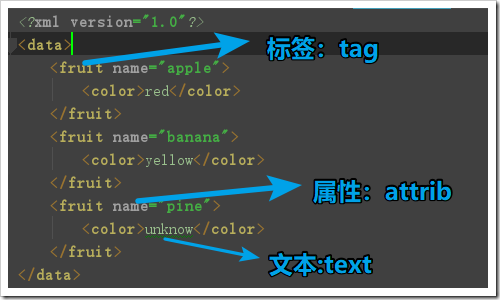xml:
介绍:包含关于可扩展标记语言xml的函数
使用:
- python有三种方法解析XML--SAX,DOM,以及ElementTree,由于xml技术落后,所以这里不对sax,dom介绍:
xml文本:
<?xml version="1.0"?> <data> <fruit name="apple"> <color>red</color> </fruit> <fruit name="banana"> <color>yellow</color> </fruit> <fruit name="pine"> <color>unknow</color> </fruit> </data>
ElementTree的使用:导入模块--》获取解析对象--》获取结点--》操作结点
#导入模块 import xml.etree.ElementTree as ET #创建对应解析对象 tree=ET.parse('data.xml') #获取结点 root=tree.getroot()#获取根节点 print(root.tag) # print(root.getchildren())#获取子结点 #通过迭代获取子结点,“建议” for child in root: print(child.tag)#获取子结点的标签 print(child.attrib)#获取子结点的属性 print(child.text)#获取子结点的文本 for cc in child:#孙子结点 print(cc.tag) print(cc.attrib) print(cc.text) print("-----------------") #通过标签名查找结点: for i in root.findall('fruit'):#这个只能找子结点 print(i.tag) print(i.attrib) print(i.text) print("*********************") for i in root.iter('color'): print(i.tag) print(i.text) ###查找结点并修改 print("*********************") for i in root.iter('color'): print(i.text) if i.text=='unknow': i.text='unknowd'#修改text #设置属性用set: i.set(属性名,属性值) tree.write("data2.xml")#可写回原文件,也可新写来另外的文件 ###查找结点并删除 for i in root.findall('fruit'): if i.attrib['name'] == 'pine': root.remove(i)#从父结点删除子结点 tree.write("data3.xml")#可写回原文件,也可新写来另外的文件 ###新建结点 new_xml = ET.Element("new parent")#新建父结点 注:只能有唯一一个父结点,这相当于新建xml son_name = ET.SubElement(new_xml, "name", attrib={"att": "yes"})#新建子结点 son_color = ET.SubElement(son_name, "color", attrib={"att": "no"}) son_color.text = 'unknow' name2 = ET.SubElement(new_xml, "name", attrib={"att": "no"}) color2 = ET.SubElement(name2, "color") et = ET.ElementTree(new_xml) # 生成文档对象 et.write("test.xml", encoding="utf-8", xml_declaration=True)#写入文件,确定格式
configparser:
介绍:包括关于配置文件的函数
初始文本内容:
[DEFAULT] ip = 192.168.1.1 hostname=aotuman [african] color = black luck = no
用法:
#导入模块 import configparser #创建解析器 con=configparser.ConfigParser() print("-------读-------------") con.read('config.ini') print(con.default_section)#默认标签的标签名 print(con.defaults())#默认标签的结果 print(con.sections())#默认标签以外的标签名 print(con['african']['color'])#获取对应标签属性 print("-------------写的方式------------") con["DEFAULT"] = {'root':'yes'}#覆盖式修改 con['Europe'] = {'color':'white','luck':'super'}# con['Europe']['life']='0'#增加式修改 with open('example.ini', 'w') as configfile: con.write(configfile)#写回,或写到新文件 print("-------------增加------------") #先判断是否存在 if con.has_section('superman')==False: con.add_section('superman') con['superman']={'size':'big'} with open('example2.ini', 'w') as configfile: con.write(configfile) # 写回,或写到新文件 print("-------------删除------------") # con.remove_option('Europe','life')#删除选项 con.remove_section('Europe')#删除标签 with open('example3.ini', 'w') as configfile: con.write(configfile) # 写回,或写到新文件
注意:所有的赋值都要使用字符串
hashlib:
介绍:包括关于hash加密的函数【hmac 和hashlib都是python中常用的加密模块】
用法:
#导入模块 import hashlib my_md5=hashlib.md5()##选择加密方式,创建对象 my_md5.update(b'123')#添加加密文本 my_md5.update('中文'.encode())#需要转换成bytes才能加密 print(my_md5.hexdigest())#以十六进制格式显示加密信息(常用) # ######## sha1 ######## hash = hashlib.sha1() hash.update(b'123') print(hash.hexdigest()) # ######## sha256 ######## hash = hashlib.sha256() hash.update(b'123') print(hash.hexdigest()) # ######## sha384 ######## hash = hashlib.sha384() hash.update(b'123') print(hash.hexdigest()) # ######## sha512 ######## hash = hashlib.sha512() hash.update(b'123') print(hash.hexdigest())

